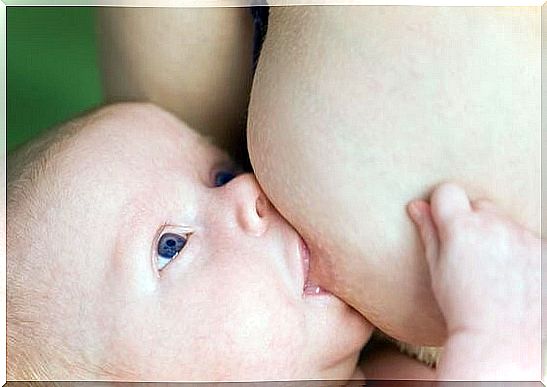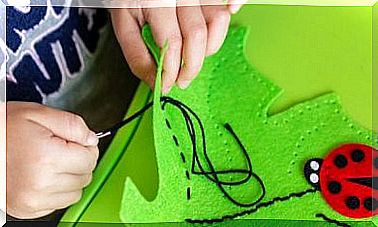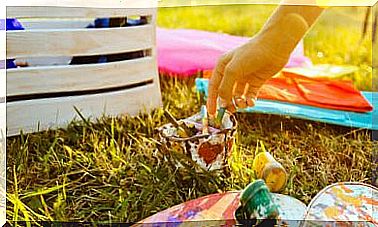The First Days At Home With The Baby

After nine months of waiting you have your baby in your arms. However, doubts invade your head and bring with them some fears that these changes imply. The best thing to do in these first days at home with your baby is to stay calm and enjoy this unique and so special moment.
You may have heard that the newborn just eats and sleeps. This first step towards motherhood is not easy: you must meet your baby’s needs even if you feel tired and have body aches. The solution is not to despair and ask for help so that you can use your child’s sleep periods to rest.
The first days at home with your baby tend to influence the whole family and involve an adaptation to the new routine. However, it is advisable to face this situation calmly and without fear. What are these new journeys like and how to deal with the new family member?
The first days at home with the baby: the adaptation begins
Although the first few days at home with the baby are very anxious for first-time moms, don’t panic. It is essential to attend to the newborn’s behavior. It must adapt to outside life: oxygenation and nutrition will no longer reach through the umbilical cord and the protection of the uterus disappears.
Relax! In addition to having the help of family members and the medical team, all mothers have the best weapons to overcome this moment: instinct, affection and maternal common sense. Below, we’ll share some essential advice for this moment.
Baby Feeding
The newborn has a small stomach, so feed your child small portions and often. Many will ask for Mom’s breast or bottle every two or three hours while others will feel hungry more often.
With the baby in your arms it will be very easy to tell if he is hungry. He will start to utter a grunt that will soon turn into screaming or crying. In addition, there are more subtle signs such as sucking your little hands, moving your mouth as if you want to suckle, or turning your head towards your chest.
Hiccup, belching and vomiting
Some babies need to be burped frequently, while others do it naturally and almost unaided. It’s a matter of evaluating your behavior at the time of breastfeeding. If the baby is fidgety or irritable, he will probably need to release this air.
Also, you shouldn’t be scared if your child has hiccups or vomiting. It’s completely normal and doesn’t cause them any kind of discomfort. Also, don’t be surprised when your little one regurgitates or spits out some milk during or after each feed.
Now, if the child vomits excessively and arches his back or cries in the meantime (especially at night), consider reflux. This is common in newborns and improves when the baby gains control of the head muscles.

Let’s talk about the diaper
The condition of the diaper can cause discomfort and even dermatitis. If the baby takes breast milk, it is possible that he will pee at least five times a day. If you feed him with formula milk, he will urinate even more, wetting up to ten diapers a day.
However, newborns who receive breast milk tend to poop more often than those who receive formula. This is due to the time it takes to digest each type of milk. So be mindful of the child’s bowel movement frequency if the doctor asks about it.
Your child’s first stool is black and solid (“meconium”). During the first few days, a baby’s diapers may have a greenish, brown or mustard and grainy poop if taken from the breast, or very pasty and variable in color if formula is used.
What about crying?
Your child will cry. This is an impossible thing to avoid or prevent. It’s your way of expressing your discomfort or unmet needs. You will notice that during the first few days at home your baby is very calm and sleepy.
However, a few weeks later the newborn will cry an average of two hours a day. The good news is that over time, you will be able to begin to identify the reasons why your baby cries.
If you are a first-time mom, you can check to see if your baby cries because of the condition of the diaper, hunger, tiredness, or discomfort. If the crying is not due to these factors, it may be that the baby has been exposed to excessive stimuli.
The controversial sleep of the newborn
During the first few days at home, your child will not get much sleep and will often wake up to feed. However, counting all the little naps, your baby will sleep an average of 16 to 18 hours a day.

Be it the car seat, the bassinet, the baby carrier or the lap… Most babies will feel more comfortable and snuggled in “small” places that refer to the mother’s womb. For this reason, newborns like to be wrapped in blankets and blankets that reproduce what was their natural environment for 9 months, in addition to avoiding spasms and natural reflexes.
The bath
You’ve certainly been told that bath time will come when the umbilical cord drops. However, you can take care of hygiene through sponge baths these first few days at home. You can also use baby wipes to clean the folds of skin from your child’s body.
The last thing you should clean is the diaper area, applying petroleum jelly or an ointment that will dry out possible skin rashes and irritations (rashes). Also, don’t be alarmed if the skin is flaking, has erythema, cradle cap, or if the baby has dry skin.
It is essential to take care of the newborn’s umbilical cord, which requires cleaning at every diaper change. The baby’s navel should be covered with sterile gauze and its appearance should be checked so that it remains dry and clean at all times.
Changes in your body
Your body will face great changes after giving birth. With the arrival of your baby, you will start producing milk soon after generating an antibody-rich liquid called “colostrum”, which is yellower than breast milk. Your breasts will likely feel fuller, firmer and heavier.
Breastfeeding is not just about feeding your child, it is also a unique way to connect with the life that has gone out of you. However, in the first few days at home with your baby, some difficulties will arise when breastfeeding. Although it is difficult, you should get the baby to suckle from both breasts.
A separate chapter, the nipples deserve special care in these early days of motherhood. Breastfeeding causes a lot of pain and tenderness in the area that starts to crack. To alleviate this feeling, apply purified lanolin or calendula ointment and apply your own milk to moisten your nipples.









